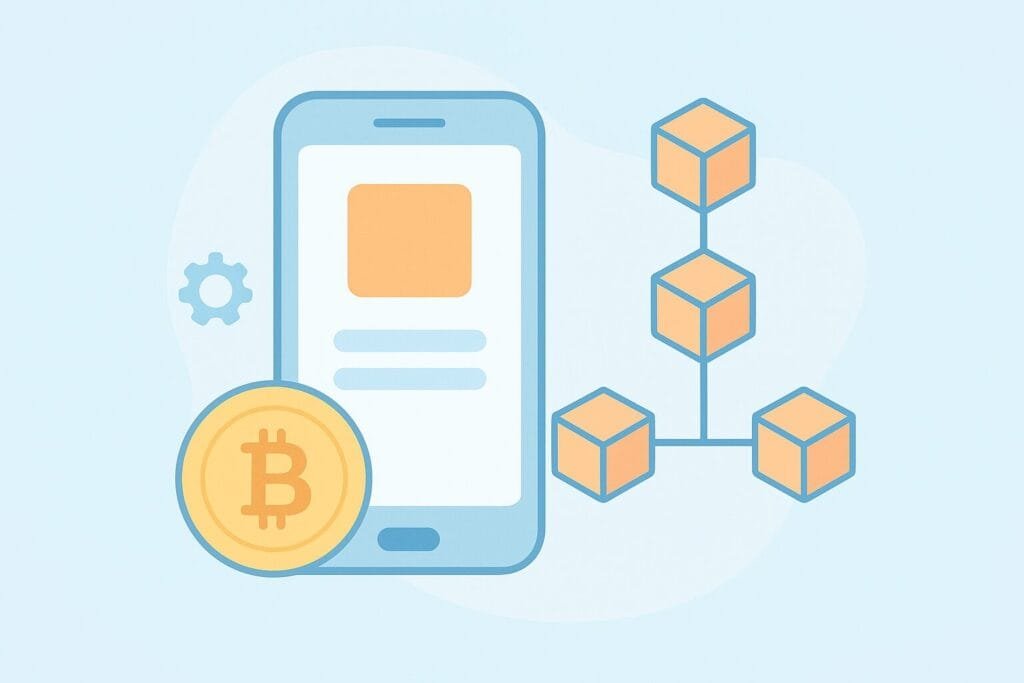Blockchain technology has moved far beyond the world of cryptocurrencies like Bitcoin and Ethereum. Today, it is being integrated into a wide range of industries, and one of the most exciting areas of application is in mobile apps. From finance and supply chain management to gaming and healthcare, blockchain is transforming how mobile applications operate, offering enhanced security, transparency, and efficiency. This article will explore how blockchain is being used in mobile apps, its benefits, challenges, and what the future might hold for this innovation.

What Is Blockchain in Simple Terms?
Blockchain is a decentralized and distributed digital ledger that records transactions across many computers in a secure and immutable way. Each transaction is verified by network participants and added to a block, which then connects to previous blocks, forming a chain. This structure makes it nearly impossible to tamper with past records, ensuring trust and transparency without the need for a central authority.
Why Mobile Apps Are Adopting Blockchain
The mobile app industry is increasingly adopting blockchain due to rising concerns over data privacy, in-app security, and digital payment integrity. Traditional databases are often vulnerable to hacking and data leaks. Blockchain provides a safer alternative by distributing data and using cryptographic methods for verification.
Key Benefits of Blockchain in Mobile Apps
- Enhanced Security: Blockchain’s cryptographic design ensures that user data is secure and almost impossible to manipulate.
- Transparency: Transactions and operations can be verified by all participants, reducing fraud.
- Decentralization: No single entity has full control over data, giving more power to users.
- Improved Payment Systems: Blockchain enables fast, low-cost cross-border payments within apps.
- Smart Contracts: Apps can execute automatic agreements when pre-defined conditions are met, making processes faster and more reliable.
Real-World Use Cases of Blockchain in Mobile Apps
1. Mobile Banking and Finance Apps
Blockchain is revolutionizing mobile banking apps by enabling faster international money transfers and offering secure digital wallets. Financial apps integrate blockchain to allow peer-to-peer transactions without high fees or delays.
2. Gaming Apps
In mobile gaming, blockchain is being used to manage digital assets such as NFTs (non-fungible tokens). Players can truly own in-game items and even trade them across platforms, creating new revenue opportunities for developers and gamers alike.
3. Supply Chain and Logistics Apps
Apps in the logistics sector use blockchain to track goods in real time, ensuring authenticity and reducing fraud. Every step of the supply chain can be verified through blockchain entries, making the entire process more transparent.
4. Healthcare Apps
In healthcare, blockchain helps secure sensitive patient records. Mobile health apps use blockchain to ensure data integrity and provide patients with control over who accesses their personal information.
5. Identity Verification Apps
Blockchain-based mobile apps can provide decentralized digital identities. Users no longer need to rely on centralized platforms to prove their identity, reducing the risks of identity theft.
Comparison: Traditional Apps vs Blockchain-Based Apps
| Feature | Traditional Apps | Blockchain-Based Apps |
|---|---|---|
| Data Storage | Centralized server | Distributed ledger |
| Security | Vulnerable to hacks | Cryptographically secured |
| Transparency | Limited visibility | Full transaction transparency |
| Costs | Higher fees for transactions | Reduced costs via smart contracts |
| Control | Controlled by central authority | User-controlled and decentralized |
Challenges of Using Blockchain in Mobile Apps
While blockchain brings many advantages, there are also challenges that developers face:
- Scalability Issues: Blockchain networks can be slow compared to centralized systems when handling large volumes of transactions.
- User Experience: Integrating blockchain can sometimes make apps less intuitive for non-technical users.
- Regulatory Barriers: Different countries have different regulations around blockchain use, making compliance complex.
- High Development Cost: Building a blockchain-based mobile app requires specialized expertise, which can increase costs.
Future of Blockchain in Mobile Apps
The future of blockchain in mobile apps looks promising. As technology advances, more efficient and scalable blockchain networks are emerging, such as Ethereum and newer blockchain solutions designed for mobile environments. With the increasing demand for security and transparency, blockchain will likely become a standard feature in many mobile applications, ranging from finance and gaming to healthcare and beyond.
Conclusion
Blockchain is reshaping the mobile app industry by providing greater security, decentralization, and transparency. While challenges remain, the opportunities are immense. Developers and businesses that embrace blockchain today will be better positioned to meet future demands for trust and innovation in mobile apps.

